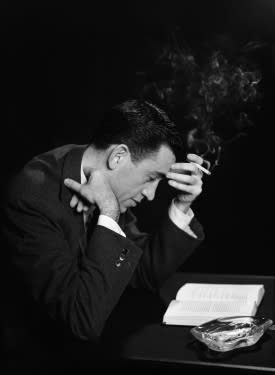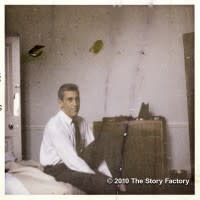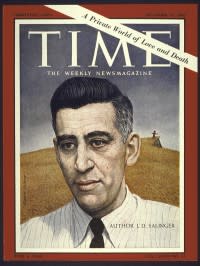Next Up For J.D. Salinger Docu: Film Distribution Deal To Follow S&S Book Pact
2ND UPDATE, 9:23 AM: It has been quite a week for J.D. Salinger. The Shane Salerno documentary Salinger has been shown to only two parties so far, and in both cases, the result was a smashing deal. First to see it was the American Masters team, which quickly paid low-seven figures to license U.S. domestic TV rights and make it the 200th installment of the prestigious program in January. Second to see it were the Simon & Schuster editors, who quickly made a worldwide rights deal on the companion book, The Private War Of J.D. Salinger. Agency sources tell me that deal was closer to $2 million than $1 million for the sprawling book by David Shields and Salerno. It will be published in September, just ahead of the theatrical release.
Next up: the feature distribution deal. I don’t get the impression there will be a big gang bang screening and then an auction; it will be a subtler, more selective process than that. But the goal is to lock in a distributor who’ll give it a nice theatrical play in the months before the American Masters premiere next year, and figure out DVD and those other ancillaries excluding U.S. domestic TV rights. By the time all this is done, it should be a nice outcome for Salerno and the eight years and $2 million he invested to assemble both the film and the book.
1ST UPDATE, JAN 28 PM: Since Deadline’s break this morning on the licensing deal of the feature documentary Salinger to PBS’ American Masters, the response by film distributors to the life story of J.D. Salinger has been strong. The only screenings have been done for American Masters and a book publisher. No film distributors have yet to see the film, as far as I know. More screenings of the film are being added. “The response has been overwhelming,” said Shane Salerno. The film has blown up in the Twitter-verse as well. Among those Salinger fans: P Diddy, who just tweeted a link to Deadline’s story to his 9 million-plus followers and congratulated Salerno.
EARLIER EXCLUSIVE, JAN 28 AM: Not all of last week’s indie film deal-making action took place at the Sundance Film Festival in Park City. Three years to the day that The Catcher In The Rye author J.D. Salinger died and Deadline revealed a feature documentary on the reclusive author had been completed, the U.S. television rights to the Shane Salerno-directed Salinger have been licensed to Thirteen/WNET to be the 200th episode of the PBS series American Masters. Feature rights will next be auctioned for a theatrical release in September to precede the January 2014 PBS special. In addition, The Private War Of J.D. Salinger — an 800-page biography written by bestselling author David Shields and Salerno and informed by the eight years of research for the documentary — will be auctioned to publishers later this week.
Related: Secret J.D. Salinger Documentary & Book, Now Revealed (Mike Has Seen The Film)
Since Salerno had completed most of the film when I viewed an early cut in late 2009, why has it taken so long to start showing the film to buyers? Salerno told me it’s because the documentary took on a much different form after my original piece created a stir in the wake of Salinger’s death. Colleagues of the author who’d ignored or rebuffed interview requests for fear of offending the reclusive author began calling. More than a dozen were included in the finished film. It’s still about two hours long, but their inclusion changed both the documentary and the biography.
“I walked out of Technicolor the day he passed away with a final print, fully mixed, mastered, color corrected,” Salerno told Deadline. “About three days after he passed away, the phone rang and it was someone who’d had a deeply close, personal relationship with Salinger. The public will never have heard of him, but I’d chased him for years. This person said, when can you come?
“A lot of people in my life who’d already spent so much time on this wanted to get the film out, especially after all the attention that came with his passing,” Salerno said. “At the end of that seven-hour interview, they all said, we need to call everybody who said no. We did, and some of them called us. The 14 additional people in the film, whose interviews ranged from three to seven hours, required major changes to keep the running time the same. Things we’d fallen in love with suddenly weren’t going to make the cut and a lot of hard decisions had to be made. Major chunks came out to make room for new stuff that was much better.”
Why the change of heart?
“There were people who’ve been quiet 40 or 50 years, some of whom didn’t want to disappoint him,” Salerno said. “After his passing, it became part of some cathartic release they needed after being quiet so long. Once the camera went on, they had so much to say that was pent up. The most emotional interviews were the ones that happened right after Salinger passed away for the obvious reason, but also because they had unresolved feelings and didn’t have closure with him. That closure came from them talking to him, through us. At that point I knew we were two years away from being done.”
It is an unusual strategy to first sell TV rights to a documentary. Most with theatrical ambitions seek a film distributor that funnels their releases through ancillary output deals that include television. PBS has been courting Salerno since Deadline’s original story, and they were the only ones shown the film. I’ve heard in agency circles that they made a deal unprecedented for the broadcaster, and that Salerno has recouped the bulk of the $2 million he spent out of his own pocket to make the film.
“I’ve spent eight years on Salinger, and he was so protective of his work that I had an obligation to be protective over the presentation of his life,” Salerno told me. “American Masters covers the finest artists this country has produced, from Ernest Hemingway to John Lennon, F. Scott Fitzgerald and Woody Allen. Salinger is an American master and I wanted to see him in the company of those artists.”
The project was reeled in by American Masters creator and exec producer Susan Lacy, who has become the film’s exec producer. “Shane’s film is an extraordinary piece of work; the more recognition Salinger received, the more reclusive and enigmatic he became, refusing all interviews and trying to block all coverage,” she said. “With the embargo finally lifted, it is my intellectual and emotional thrill to bring the inimitable J.D. Salinger into the American Masters library. I cannot envision a more appropriate subject for our 200th broadcast in January.”
Said WNET programming VP Stephen Segaller: “We never thought we’d see a film on the most elusive author in modern history, especially a film as gripping and powerful as this one. American Masters on PBS once again the place for unparalleled films on iconic cultural subjects.”
Most of the documentaries done for the series are generated in-house, but they made this an exception. Salerno retained full ownership of the film, and will now begin to sell in platforms that include theatrical, home video and worldwide film and TV.
It has been a long time since I saw the film in December 2009 (Salerno showed it to me after I’d heard about it from an interview subject, and I viewed it under agreement I would keep it quiet until it was shopped, which changed when the author died). It’s hard to remember specifics, so here is what I wrote three years ago, when the earlier cut of the film was fresh in my brain:
“I found the film, which doesn’t have narration, to be exhaustively researched and arrestingly powerful. Most importantly, it answers a lot of questions I and everyone have had about the author. There is previously unseen footage and photos, and a rich depiction of that unfathomable period in Salinger’s career when The New Yorker magazine was able to publish a new “J.D. Salinger” story fairly regularly.
There also are details of: his WWII soldiering in Normandy and interrogation of Nazi prisoners; his love affair with Eugene O’Neill’s daughter Oona, and the crushing disappointment of losing her to Charlie Chaplin while Salinger fought in Europe; Salinger’s habit of locking himself away in his New Hampshire cinder block bunker for weeks at a time to write; his penchant for taking a week to craft a single sentence; the damage his silences caused his family; the futile efforts of friends to re-introduce him to the world; Salinger’s protectiveness towards his work; his refusal to sell anything to Hollywood, turning down 8-figure offers and first-class filmmakers like Billy Wilder and Steven Spielberg; his determination to maintain total control over his prose (so that when a New Yorker editor once added a comma, Salinger never spoke to him again).
Even more intriguing, Salerno’s documentary also reports on what J.D. Salinger literary works might be in the famed secret vault, where 45 years of unpublished writings are rumored to be kept.
Salerno told me the project began when he purchased the rights to Paul Alexander’s book Salinger: A Biography and tried to turn it into a feature. He realized during interviews with Salinger’s peers that these 80+-year-old men wouldn’t be around much longer. That’s when he switched focus to the documentary, which was still based on Alexander’s book. Salerno succeeded in getting to many sources just before they died, though sadly didn’t get there in time for others.
A feature would have been a challenge anyway, since Salinger was so litigious and protective of his privacy. (He sued successfully to stop a book that contained his unpublished letters, and halted a Catcher in the Rye sequel novel by another author.) Salinger never sued over Alexander’s book, however.
But other attempts to put Salinger on the big screen have been unsuccessful. W.P Kinsella’s book Shoeless Joe incorporated Salinger as a kidnapped character. When it was adapted for the screen into Field of Dreams in 1989, Salinger was turned into a fictionalized reclusive author “Terry Mann” played by James Earl Jones. In another project, Sean Connery acknowledged that the inspiration for his role in 2000′s Finding Forrester was Salinger, yet that character was fictionalized as “William Forrester”.
Salerno went into the documentary expecting it to be a 6-month project. But it grew into a five-year obsession.”
Salinger has turned out to be an eight-year obsession waged while Salerno was writing or co-writing scripts that included the Oliver Stone-directed adaptation of Don Winslow’s Savages, and projects for James Cameron, Michael Mann and Leonardo DiCaprio. He cut the film at Technicolor, and the house preserved the secrecy of what it labeled “Project Y”. Discretion was also paid to interview subjects, with certain crew members setting up equipment and then leaving so they would not know who was being captured on film. Salerno wouldn’t say which Salinger acquaintances were added to the film. Back when I first wrote, he said that among those heavily influenced by the author who were interviewed for the movie are Philip Seymour Hoffman, Edward Norton, John Cusack, Tom Wolfe, Gore Vidal, E.L. Doctorow, Martin Sheen, Danny DeVito, A. Scott Berg and others.
Salerno added to the film a score by Lorne Balfe, the co-composer of Christopher Nolan’s Inception and The Dark Knight, with other credits that include Frost/Nixon. The film’s produced by Salerno, Buddy Squires, Deborah Randall and Craig Fanning.
I asked Salerno if we will finally learn from his film what writing Salinger left behind in the vault of his home in Cornish, New Hampshire, or whether he actually got screen time with arguably the most famous author of the 20th century. The filmmaker wasn’t biting.
“What I am comfortable saying at this point is, there are some significant surprises in the film, and it is substantial and comprehensive. We were at this eight years. The point of the photo we gave Newsweek after your article was, this is a photo of the man on his bed at the height of his reclusiveness. It was our way of saying we have what we say we have, and are as inside as anyone has ever been there is significant content and revelations.”
Salerno is repped by CAA and attorney Robert Offer, and the book will be auctioned by Salerno’s The Story Factory.
Related stories
CAA Signs Filmmaker-TV Titan J.J. Abrams
EXCLUSIVE: Jeff Berg Opens New Agency ‘Resolution’ Monday; UPDATE: Investor ID
Get more from Deadline.com: Follow us on Twitter, Facebook, Newsletter



